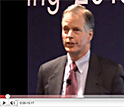News Release 10-174
New Study Validates Factors That Enhance the Intelligence of a Group
Tendency to cooperate effectively is linked to the number of women in a group

A team working on one of the tasks used in the study involving detailed instructions and Legos®.
October 1, 2010
Watch a video of lead author Anita Woolley describing the study's findings, a video of Thomas Malone's presentation at the 2010 World Economic Forum, or a video of Thomas Malone explaining group intelligence.
This material is available primarily for archival purposes. Telephone numbers or other contact information may be out of date; please see current contact information at media contacts.
According to new study co-authored by researchers at the Massachusetts Institute of Technology, Carnegie Mellon University and Union College, group intelligence may not be quantified as the sum or average of the cognitive abilities of its members.
By studying small teams of randomly assembled individuals, researchers discovered that groups featuring the right kind of internal dynamics perform well on a wide range of assignments, regardless of the sum or average individual cognitive abilities of the group's members.
Further, a group's intelligence, or its ability to complete a series of demanding multi-functional tasks, is positively linked to higher levels of "social sensitivity," a more equal distribution of member participation levels, and to the number of women in a group.
Social scientists had long contended that a measurable level of intelligence in each individual person is a predictive measure of an individual's ability to fare well on diverse cognitive tasks.
"Evidence for a Collective Intelligence Factor in the Performance of Human Groups" has been accepted for publication in the scientific journal Science and was pre-published online in the Sept. 30 Science Express.
-NSF-
-
View a video of Thomas Malone's presentation at the WEF.
Credit and Larger Version -
View Video
First Author Anita Woolley of CMU describes the study's findings.
Credit and Larger Version -
View a video of Thomas Malone explaining group intelligence.
Credit and Larger Version -
Anita Williams Woolley, lead author and assistant professor at CMU's Tepper School of Management.
Credit and Larger Version -
Thomas W. Malone, Director, MIT Center for Collective Intelligence and Sloan Management Professor.
Credit and Larger Version -
Christopher F. Chabris, co-author and assistant professor of psychology at Union College.
Credit and Larger Version
Media Contacts
Jennifer Hirsch, MIT, (617) 253-1682, email: jfhirsch@mit.edu
Lisa-Joy Zgorski, NSF, (703) 292-8311, email: lzgorski@nsf.gov
Mark D. Burd, Carnegie Mellon University's Tepper School of Business, (412) 268-3486, email: mdburd@andrew.cmu.edu
Principal Investigators
Christopher F. Chabris, Union College, (518) 388-6000, email: chabris@gmail.com
Anita Williams Woolley, Carnegie Mellon University, (412) 268-2287, email: awoolley@cmu.edu
Thomas W. Malone, MIT Center for Collective Intelligence, 617-253-6843, email: malone@mit.edu
Related Websites
Science: Evidence for a Collective Intelligence Factor in the Performance of Human Groups: http://www.sciencemag.org/cgi/content/abstract/science.1193147
CMU News Release: http://www.cmu.edu/news/
MIT News Release: http://web.mit.edu/press/2010/collective-intel.html
The U.S. National Science Foundation propels the nation forward by advancing fundamental research in all fields of science and engineering. NSF supports research and people by providing facilities, instruments and funding to support their ingenuity and sustain the U.S. as a global leader in research and innovation. With a fiscal year 2023 budget of $9.5 billion, NSF funds reach all 50 states through grants to nearly 2,000 colleges, universities and institutions. Each year, NSF receives more than 40,000 competitive proposals and makes about 11,000 new awards. Those awards include support for cooperative research with industry, Arctic and Antarctic research and operations, and U.S. participation in international scientific efforts.
Connect with us online
NSF website: nsf.gov
NSF News: nsf.gov/news
For News Media: nsf.gov/news/newsroom
Statistics: nsf.gov/statistics/
Awards database: nsf.gov/awardsearch/
Follow us on social
Twitter: twitter.com/NSF
Facebook: facebook.com/US.NSF
Instagram: instagram.com/nsfgov








